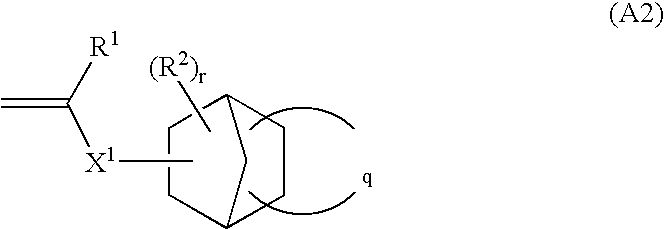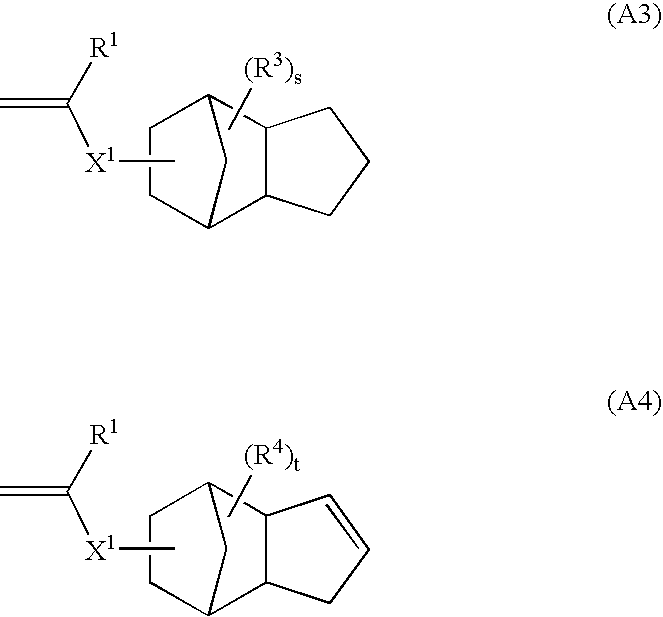Ink composition, inkjet recording method, and printed material
a technology of inkjet recording and composition, applied in the direction of inks, synthetic resin layered products, nuclear engineering, etc., can solve the problems of insufficient curability, insufficient dispersion stability, insufficient photocuring and storage stability, etc., to improve pigment dispersion stability, and enhance the dispersibility of finer pigment particles
- Summary
- Abstract
- Description
- Claims
- Application Information
AI Technical Summary
Benefits of technology
Problems solved by technology
Method used
Image
Examples
synthetic example 1
[0332]Synthesis of Polymerizable Oligomer (d-1) Comprising Repeating Unit of Formula (D1)
[0333]A nitrogen-flushed three-necked flask was charged with 80 parts by weight of anhydrous propylene glycol monomethylether acetate, 62.4 parts by weight of 3-dimethylaminopropylacrylamide (Tokyo Chemical Industry Co., Ltd.), and 5.36 parts by weight of 6-mercaptohexanol (Aldrich), stirred using a stirrer (Three-One Motor, Shinto Scientific Co., Ltd.), and heated to 105° C. while passing nitrogen into the flask. 0.288 parts by weight of VA-086 (2,2′-azobis[2-methyl-N-(2-hydroxyethyl)propionamide], Wako Pure Chemical Industries, Ltd.) was added thereto, and stirring was then carried out for 2 hours. A further 0.144 parts by weight of VA-086 was added thereto, and stirring and heating were carried out at 115° C. for 4 hours. After the reaction solution was cooled to 50° C., 6.39 parts by weight of Karenz MOI (2-methacryloyloxyethyl isocyanate, Showa Denko K. K.) was added thereto, and stirring w...
synthetic example 3
[0337]Graft copolymer 3 (corresponding to the above-mentioned PA4) was obtained in the same manner as in Synthetic example 1 except that Starting solution 1 of Synthetic example 1 was changed to Starting solution 2 below. The weight-average molecular weight of graft copolymer 3 was 32,000.
Starting Solution 2
[0338]
Polymerizable oligomer 1 (solids concentration7.1 parts by weight 28%)Terminal methacryloylated polymethyl methacrylate16 parts by weight(AA-6, number-average molecular weight6,000, Toagosei Co., Ltd.)N,N-Dimethylaminoethyl methacrylate (Tokyo 2 parts by weightChemical Industry Co., Ltd.)V-65 (2,2′-azobis(2,4-dimethylvaleronitrile),0.2 parts by weight Wako Pure Chemical Industries, Ltd.)Methyl ethyl ketone (Wako Pure Chemical19 parts by weightIndustries, Ltd.)
synthetic example 4
[0339]A nitrogen-flushed three-necked flask was charged with 29 parts by weight of cyclohexanone, stirred using a stirrer (Three-One Motor, Shinto Scientific Co., Ltd.), and heated to 90° C. while passing nitrogen into the flask. Starting solution 3 below, which had been prepared separately, was added dropwise thereto over 2 hours. 2 hours after the dropwise addition was completed, 0.06 parts by weight of V-65 (2,2′-azobis(2,4-dimethylvaleronitrile), Wako Pure Chemical Industries, Ltd.) was added thereto, and heating and stirring were carried out for 1 hour, thus giving a polymer having a solids content of 31%.
[0340]A nitrogen-flushed three-necked flask was charged with 0.016 parts by weight of polyethyleneimine (Aldrich) and 0.091 parts by weight of cyclohexanone, and while stirring using a stirrer 5.93 parts by weight of the polymer solution obtained above and 5.94 parts by weight of cyclohexanone were added thereto dropwise over 30 minutes. A reaction was continued for a further ...
PUM
| Property | Measurement | Unit |
|---|---|---|
| wt % | aaaaa | aaaaa |
| viscosity | aaaaa | aaaaa |
| particle size | aaaaa | aaaaa |
Abstract
Description
Claims
Application Information
 Login to View More
Login to View More - R&D
- Intellectual Property
- Life Sciences
- Materials
- Tech Scout
- Unparalleled Data Quality
- Higher Quality Content
- 60% Fewer Hallucinations
Browse by: Latest US Patents, China's latest patents, Technical Efficacy Thesaurus, Application Domain, Technology Topic, Popular Technical Reports.
© 2025 PatSnap. All rights reserved.Legal|Privacy policy|Modern Slavery Act Transparency Statement|Sitemap|About US| Contact US: help@patsnap.com



